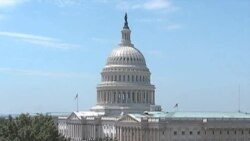WASHINGTON —
Americans are bracing for a partial shutdown of the national government that looks increasingly likely to begin Tuesday, as a politically-divided Congress remains unable to agree on a formula to extend federal spending authority. Absent a last-minute deal, non-essential government services will halt and hundreds of thousands of federal workers will be idled.
Tempers flared late Saturday in House of Representatives before the Republican-controlled chamber approved a spending bill.
“This is a bill to keep the government open,” said Congressman Rob Woodall, who hailed a provision in the bill delaying implementation of President Barack Obama’s signature healthcare law.
“It asks to delay it [Obamacare] for one year. For one year.”
Democrats blasted Republican tactics to cripple the Affordable Care Act, also known as “Obamacare.”
“Another chapter of Republican hostage-taking: threatening to shut down the government or refuse to pay the country’s bills if they do not get their way politically,” said Congressman David Price.
Republicans insist they are simply representing their constituents’ concerns.
“We have heard a lot in this chamber about the government," said Congressman Mark Meadows. "The government this, the government that, when do we start focusing on the people?”
The House bill goes back to the Democratic-controlled Senate, which last week voted to extend federal funding with no other provisions attached. Majority Leader Harry Reid called the House bill “pointless”, and said that only a “clean” spending bill will reach President Obama’s desk. The president has refused to negotiate with Republicans.
“No one gets to hurt our economy and millions of innocent people just because there are a couple laws you do not like," Obama said. "It has not been done in the past, and we are not going to start doing it now.”
Monday, the Senate is expected to shelve the House bill, leaving the U.S. government without spending authority as of October 1. This is the first of two fiscal fights. Later next month, Congress must extend federal borrowing authority, or risk a default on the national debt. Economists warn that a protracted government shutdown or a debt default would bring disastrous consequences.
The domestic fiscal battles come as the president pursues a nascent, fragile diplomatic opening with Iran in hopes of restricting Tehran’s nuclear program. The topic is sure to be a focus of discussions Monday when Obama hosts Israeli Prime Minister Benjamin Netanyahu at the White House.
Tempers flared late Saturday in House of Representatives before the Republican-controlled chamber approved a spending bill.
“This is a bill to keep the government open,” said Congressman Rob Woodall, who hailed a provision in the bill delaying implementation of President Barack Obama’s signature healthcare law.
“It asks to delay it [Obamacare] for one year. For one year.”
Democrats blasted Republican tactics to cripple the Affordable Care Act, also known as “Obamacare.”
“Another chapter of Republican hostage-taking: threatening to shut down the government or refuse to pay the country’s bills if they do not get their way politically,” said Congressman David Price.
Republicans insist they are simply representing their constituents’ concerns.
“We have heard a lot in this chamber about the government," said Congressman Mark Meadows. "The government this, the government that, when do we start focusing on the people?”
The House bill goes back to the Democratic-controlled Senate, which last week voted to extend federal funding with no other provisions attached. Majority Leader Harry Reid called the House bill “pointless”, and said that only a “clean” spending bill will reach President Obama’s desk. The president has refused to negotiate with Republicans.
“No one gets to hurt our economy and millions of innocent people just because there are a couple laws you do not like," Obama said. "It has not been done in the past, and we are not going to start doing it now.”
Monday, the Senate is expected to shelve the House bill, leaving the U.S. government without spending authority as of October 1. This is the first of two fiscal fights. Later next month, Congress must extend federal borrowing authority, or risk a default on the national debt. Economists warn that a protracted government shutdown or a debt default would bring disastrous consequences.
The domestic fiscal battles come as the president pursues a nascent, fragile diplomatic opening with Iran in hopes of restricting Tehran’s nuclear program. The topic is sure to be a focus of discussions Monday when Obama hosts Israeli Prime Minister Benjamin Netanyahu at the White House.





